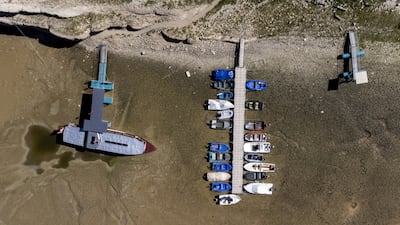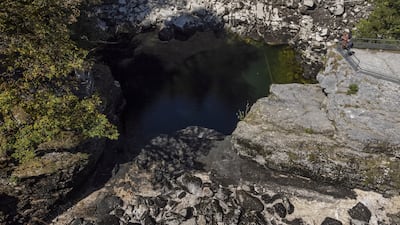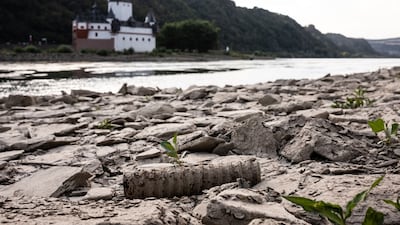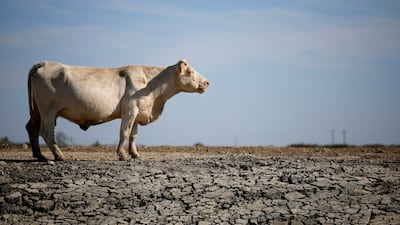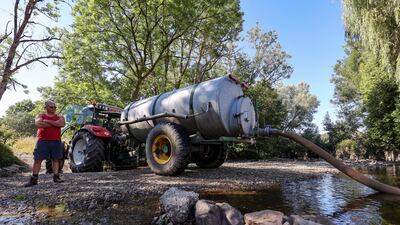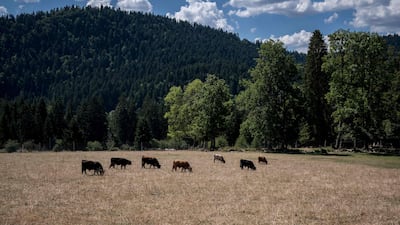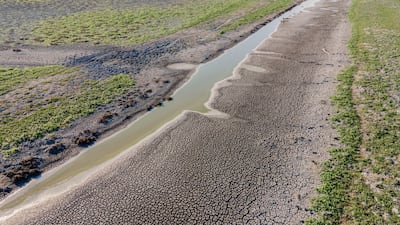Britons are braced for the second heatwave of the summer and four days of sweltering temperatures which experts have warned pose risks to young children, the elderly and those with health conditions.
Like parts of mainland Europe, there have been a series of wildfires in the UK as balmy weather and a lack of rainfall have created conditions for blazes to spread rapidly. Fire services have warned citizens not to light barbecues, fireworks and fire lanterns.
The mercury is forecast to reach 36ºC during the hot spell, which has prompted the UK Health Security Agency to impose a Level 3 health alert for heat covering southern and central England from noon on Thursday to 11pm on Sunday.
Saturday is expected to be the hottest day in the latest heatwave to hit the UK following record-breaking temperatures last month.
Thames Water, which supplies 15 million customers across London and the Thames Valley, became the latest water company to announce an imminent hosepipe ban.
“Given the long-term forecast of dry weather and another forecast of very hot temperatures coming this week, we are planning to announce a temporary use ban in the coming weeks,” the water company said.
It urged customers to use only what is essential.
South East Water and Southern Water have already announced hosepipe bans after the driest first half of the year since 1976, during which south-east England has had 144 days with little or no rain.
The threat of hosepipe bans being imposed on millions more households continues.
The Met Office has issued a four-day amber warning for extreme heat in parts of England and Wales for Thursday to Sunday, with temperatures expected to climb to 35ºC or 36ºC in some places.
Delays to travel are possible and there is an increased risk of water accidents and fires as more people head to tourist spots.
Ten engines and about 70 firefighters were called to a grass fire on the M25 in Enfield, north London.
London Fire Brigade said about five hectares of grass and shrub land were alight.
Footage on social media showed flames and thick black smoke near the motorway, where two lanes have been closed, causing congestion as firefighters tackle the blaze.
Another fire broke out on Rushmere Heath, near Ipswich, Suffolk, which has now been completely surrounded by firefighters.
Heatwave in the UK — in pictures
Temperatures are not expected to be as extreme as those in July, which smashed records when the mercury climbed above 40ºC in some areas for the first time in the UK.
Climate change is making heatwaves more intense, frequent and likely, with last month’s record temperatures made at least 10 times more likely because of global warming, and “virtually impossible” without it, research shows.
Scientists also say the likelihood of droughts occurring is becoming higher because of climate change, driven by greenhouse gas emissions from human activities.
Northend, a village in Oxfordshire, became the first community in the UK to run out of water after Stokenchurch Reservoir ran dry.
Neighbours were forced to rely on deliveries of bottled and tanker water.
Fires break out in UK during heatwave — in pictures
The dry conditions, combined with last month’s record-breaking heatwave, have depleted rivers, reservoirs and aquifers and dried up soil, hitting agriculture, water supplies and wildlife, and raising the risk of wildfires.
The latest analysis from the UK Centre for Ecology and Hydrology says that until October, river flows are likely to remain exceptionally low in central, southern and eastern England.
Groundwater levels in south England and south Wales will be below normal and exceptionally low in some areas for the next three months, according to the assessment.
Several centimetres of rain on top of what would normally be expected is needed to overcome the dry conditions in parts of southern England.
There was no immediate sign of rain in the latest forecast from the Met Office.
UK heatwave sees highest-ever recorded temperatures — video
“With high pressure dominant this week, any showers this week will be contained to the far north-west, and even here they will be short-lived,” said Met Office deputy chief meteorologist Dan Rudman.
“Further south, which has seen little rain for some time now, it will continue to be dry through the week, providing no relief for parched land, especially in the south-east.”
Temperatures are likely to rise into the low to mid-30s in the next few days in the area covered by the Met Office amber warning.
Outside the warning area, heatwave thresholds ― which are met at different temperatures in different parts of the country ― are still likely to be met for much of the UK.
Temperatures will be widely in the high 20s, with a chance of a few spots having temperatures in the low 30s.
Wildfires hit England as temperatures soar — video
Scotland and Northern Ireland will also have temperatures in the high 20s and could reach official heatwave criteria by Friday.
The Met Office’s index for how severe a fire could become if one were to start is very high for most of England and Wales, and will reach “exceptional” for a large part of England by the weekend.
The National Trust said heatwaves and prolonged spells of dry weather are having a serious effect on landscapes, gardens and wildlife.
Reports from sites the charity cares for show lichen and mosses that normally thrive in the damp atmosphere of rare temperate rainforest in Lydford Gorge on Dartmoor are shrivelling, while heather is struggling to flower on Dunwich's lowland heath in Suffolk.
Wildfires have broken out in beauty spots in Cornwall, Devon and Norfolk.
“We shouldn't be surprised by these temperatures, it's what the science has been saying for decades,” said Keith Jones, national climate change adviser for the National Trust.
“But even with years of planning, some of the effects are stark, and we are still learning of the precise impacts extreme weather events like this can have.
“What we can do, is adapt. At the trust we're taking action to make sure our sites are ready for future changes, from making our landscapes rich in nature, our rivers cooler and our gardens more resilient to helping our buildings cope with excessive heat.”
Much of Europe is also suffering from the effects of sweltering temperatures and drought.
In Switzerland the air force used helicopters to collect water from lakes and deliver it to thousands of thirsty cows grazing on mountain pastures.
In France police have been deployed to patrol streets to ensure residents and businesses are not using water wastefully.
A huge fire broke out in forestland in south-west France, destroying thousands of hectares, officials said on Wednesday.
Drought in Europe — in pictures
An additional 6,000 hectares of pine forest have burnt in the so-called Landiras blaze since Tuesday afternoon, forcing the area to be evacuated, affecting about 3,800 people, Gironde regional officials said.
“The fire is extremely violent and has spread to the Landes department” farther south, home of the Landes de Gascogne regional park, the prefecture said.
No one has been injured in the coastal area, which draws huge summer tourism crowds but 16 houses were destroyed near the village of Belin-Beliet.
Another fire is in the Maine et Loire department in western France, where 650 hectares are scorched and 500 are threatened, according to local authorities.
In Germany, economists said the drought added to the risk of a recession because the low water levels in the Rhine were slowing freight traffic along the country's longest inland waterway.
Previous dry spells knocked between 1 per cent and 1.5 per cent off industrial production, said Dr Nils Jannsen of the Kiel Institute for the World Economy.


























































